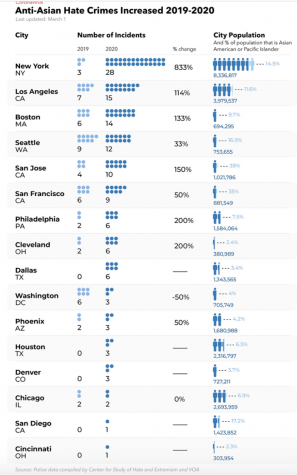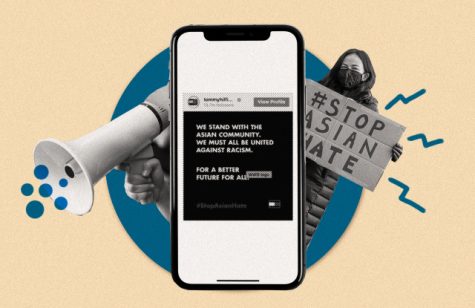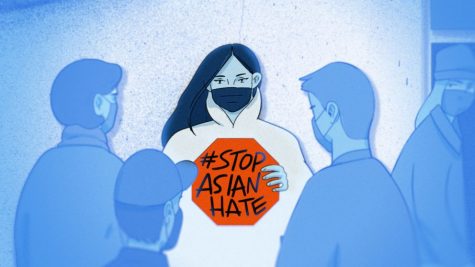Opinion and Analysis: Anti-Asian Hate Crimes—Behind the Rise in Violence
March 15, 2021
“Fight The Virus, Not The People!” is the chant that has grown in popularity among people protesting the overwhelming number of attacks on Asian Americans in response to the COVID pandemic. Asian communities across the United States have banded together to devise protests against these anti-Asian hate crimes—their emphatic efforts ushering this issue to light. The cases of anti-Asian hate crimes have increased by 150% in 2020, with many happening in our own backyard. On a morning walk in San Francisco, an 84-year-old Thai immigrant lost his life after being shoved to the ground by a 19-year-old stranger. Just last month, a 64-year-old woman was robbed waiting outside a Vietnamese restaurant in San Jose. But it’s not just in the Bay Area—these attacks are plaguing Asian communities from coast to coast. In February, a 61-year-old Filipino man suffered a knife slash to the face while waiting for a train on the New York City Subway. The sheer number of anti-Asian hate crimes within this last year is alarming, especially as the previous leader of our country has contributed to the growing hate towards Asian Americans.
the overwhelming number of attacks on Asian Americans in response to the COVID pandemic. Asian communities across the United States have banded together to devise protests against these anti-Asian hate crimes—their emphatic efforts ushering this issue to light. The cases of anti-Asian hate crimes have increased by 150% in 2020, with many happening in our own backyard. On a morning walk in San Francisco, an 84-year-old Thai immigrant lost his life after being shoved to the ground by a 19-year-old stranger. Just last month, a 64-year-old woman was robbed waiting outside a Vietnamese restaurant in San Jose. But it’s not just in the Bay Area—these attacks are plaguing Asian communities from coast to coast. In February, a 61-year-old Filipino man suffered a knife slash to the face while waiting for a train on the New York City Subway. The sheer number of anti-Asian hate crimes within this last year is alarming, especially as the previous leader of our country has contributed to the growing hate towards Asian Americans.
As COVID-19 slowly made its way onto the global scale, Former President Trump’s rhetoric when discussing the United States’s delayed response was what some would call “incredibly unprofessional.” From the very start of the COVID pandemic, Trump attributed the virus to China, permanently affecting how Americans view the so-called “China-Flu.” Scientists worldwide have determined the origin of the COVID-19 virus to be in Wuhan, China. However, another pandemic was statistically bound to occur within the next decade. COVID-19 just happened to originate in China. The former President’s ill-conceived remarks resulted in irreversible damage across Asian-American communities. Supporters began using the phrasing “China-Flu,” and it quickly became a part of his political campaign, catching on in many states. Trump supporters and others now associated the pandemic with the people of China. With the confusion and fear that this pandemic has created, people are searching for something or someone to blame. Trump’s assertive comments gave people the encouragement they needed to blame the Asian-American community as a whole and turn to violence.
Asian Americans have taken to social media to express their outrage; for example, the founding of the trending #StopAsianHate campaign. Notable Asian figures in the fashion industry have capitalized on their influential social media platforms to raise awareness, joining the #StopAsianHate movement. For instance, the longstanding editor-in-chief of the fashion magazine Allure, Michelle Lee and designer, Phillip Lim, recently posted intimate attestations of racism in their day-to-day lives as a stand against the nationwide Asian hate crimes. Henry Golding, the male lead in Crazy Rich Asians, and Chrissy Teigen have been outspoken about racism against the Asian-American community. Countless other Asian celebrities, like Olivia Munn and Daniel Dae Kim, have retweeted the hashtag and encouraged others to join the movement. Within local communities in New York, Asian-run small businesses have banded together to form the #EnoughisEnough fundraising campaign. This campaign sponsors free meals for those in the Asian community who are afraid of going outside alone to shop for groceries.
Notable Asian figures in the fashion industry have capitalized on their influential social media platforms to raise awareness, joining the #StopAsianHate movement. For instance, the longstanding editor-in-chief of the fashion magazine Allure, Michelle Lee and designer, Phillip Lim, recently posted intimate attestations of racism in their day-to-day lives as a stand against the nationwide Asian hate crimes. Henry Golding, the male lead in Crazy Rich Asians, and Chrissy Teigen have been outspoken about racism against the Asian-American community. Countless other Asian celebrities, like Olivia Munn and Daniel Dae Kim, have retweeted the hashtag and encouraged others to join the movement. Within local communities in New York, Asian-run small businesses have banded together to form the #EnoughisEnough fundraising campaign. This campaign sponsors free meals for those in the Asian community who are afraid of going outside alone to shop for groceries.
President Biden addressed the issue on his sixth day in office, calling it “unacceptable” and “un-American,” thereby ordering the Department of Health & Human Services to implement practices countering xenophobia in the country’s response to COVID-19. The President has additionally commanded the Department of Justice to forge a stronger relationship with the Asian American Pacific Islander community. The fight is not over by a long shot, but light has been shed on the partially-hidden Asian bigotry that is prevalent in this country today.


